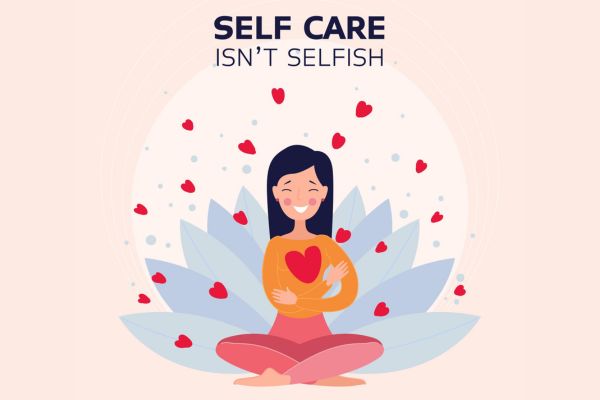“These faults and mistakes are what I am, making up the brightest stars in the constellation of my life.”- BTS’ RM
Self-esteem is one’s faith in their value or worth. It acts as a motivation by making it more or less likely that people appreciate and take care of themselves. This is an abstract concept as its hard for people who haven’t experienced high self-esteem to know what it’s like.
For e.g.: if someone loves cars, they will take excellent care of their own. They would make careful decisions like where to park, how often to get the car serviced, or how to drive it. They may bedazzle the car and showcase it to people with pride. Self-esteem is exactly like this, except it is us that we exclusively and unequivocally care for.
The 4 features which make up the esteem that we have for ourselves are:
- Self-confidence (a feeling of security)- this is the cornerstone of self-esteem. If one feels safe with family, feels loved and their needs are met, their self-esteem automatically grows. This is when we feel like we have found our place and try new experiences.
- Identity– this is what we perceive or believe ourselves to be. By experimenting, growing, and Interpreting opinions about us, we are able to locate our quirks, talents, requirements, and emotions. Our identity includes a physical part (the perception we have of our own body), and a social part (how we meet other people, the groups we socialise with, our economic standing, our status as a student, worker or teen, how we act around people, which sex attracts you etc.)
- Feeling of Belonging– we all are from many groups like family, friends, school, clubs in school etc. So, we tend to identify and define ourselves by being a part of these groups, by the equations we have with different people and our memories with them, like feeling like a part of something, experiencing brotherhood or sisterhood, seeking out the other members, good communication, sharing etc. These groups give us the conviction and sense of belonging to know that there are people who like us for who we are and who are like us.
- Feeling of Competence– in order to feel competent, we need to have various experiences, fall and get back up, and grow by learning new things. This feeling is interrelated to motivation as a person feels motivated when they face challenges that they can meet. Success then pours out as a feeling of usefulness and pride, which promotes self-esteem.
Self-esteem is not carved in stone. It constantly changes its flow and intensity like waves in the ocean, by people we meet along the way and our life experiences. Although it can be a challenge for teens, but the more different situations we experience, the more we learn about ourselves, and the better we know our identity as a person, our purpose, what we don’t want to go back to, and what we want our lives to shape up to.
Some Signs of Low Self-Esteem Are:
– Sensitivity to Criticism– having low self-esteem directly leads to becoming highly sensitive to criticism, regardless of whether it’s coming from others or yourself. This is because you start viewing that criticism as reinforcing your opinions about your “flaws” and indirectly proving to you that “you can never do anything right.”
– Social Withdrawal– for e.g.: rejecting invites to parties or catching up with your friends after school, backing out of pre-planned visits to the mall, restaurants or the movies, and painstakingly trying not to be around people. You may feel uncomfortable or suffocated, so you don’t feel like continuing conversations or talk about your life because it will only resurface the depression and/or anxiety that you are already going through.
– Hostility– for people with low self-esteem, furiously ranting or getting aggressive with others is like a defence mechanism (like how Chandler from ‘FRIENDS’ uses humour as a defence mechanism too!) You can be sure that you have low self-esteem if, when you feel that someone is going to expose or criticise you, and you naturally attack them.
– Excessive Preoccupation with Personal problems– constantly dwelling on your own personal problems takes away a lot of time for anyone with low self-esteem. Because of this relentless worrying, you may find it hard to help out or empathise with someone else’s issues as your mind is too focused with your own.
– Physical Symptoms– low self-esteem has been proved to lead to mental and physical health problems like depression, anxiety, and anorexia. It could also lead to self-damaging habits like substance abuse in the form of smoking tobacco, alcohol abuse, or drug use.
How to Deal with Low Self-Esteem:
– Identify Troubling Conditions and Situations– take a breath and think about some conditions or situations that always seem to decrease your self-esteem. For e.g.: it could be giving a speech in front of your entire class, dealing with a difficult family member or friend, or facing a kind of life-altering event like changing schools or moving to another country.
– Be Aware of your Thoughts and Beliefs– once you have identified those events, sort out your thoughts and opinions regarding it. These thoughts could be positive, negative, or neutral, or could be based on real facts or impulsive and irrational ideas. By realising your way of thinking, you can start to see if your reactions are appropriate & useful, or irrational and false.
– Challenge Negative or Inaccurate Thoughts– it’s essential to ask yourself if your thoughts are in line with the actual facts or logic. There can always be another reason for a situation, which may be truer than your opinions. It can be hard to break free from deep-rooted beliefs which have now become a part of your lived reality. It’s perfectly normal to take time and patience to fight any negatively biased beliefs that you have unintentionally built.
– Adjust you Mindset– now that you have identified the moments which seem to deflate your self-esteem and become self-aware regarding how and why you think or feel that way, you can simply take a step back and understand those thoughts and emotions. You have now harnessed the power to adjust your mindset more inclined towards the reality, to raise your self-esteem.
What we need to ultimately remember is to think of hopeful phrases, focus on the silver lining in everything, and to not be hesitant to relabel undermining thoughts about yourself.
Most importantly, don’t be reluctant to FORGIVE YOURSELF. No one is perfect and everyone has flaws. So, it doesn’t make you a selfish person, it just makes you HUMAN, and that is your greatest strength.
“Confidence is not ‘they will like me’. Confidence is, ‘I’ll be fine if they don’t’. “- Anonymous
Reference

















